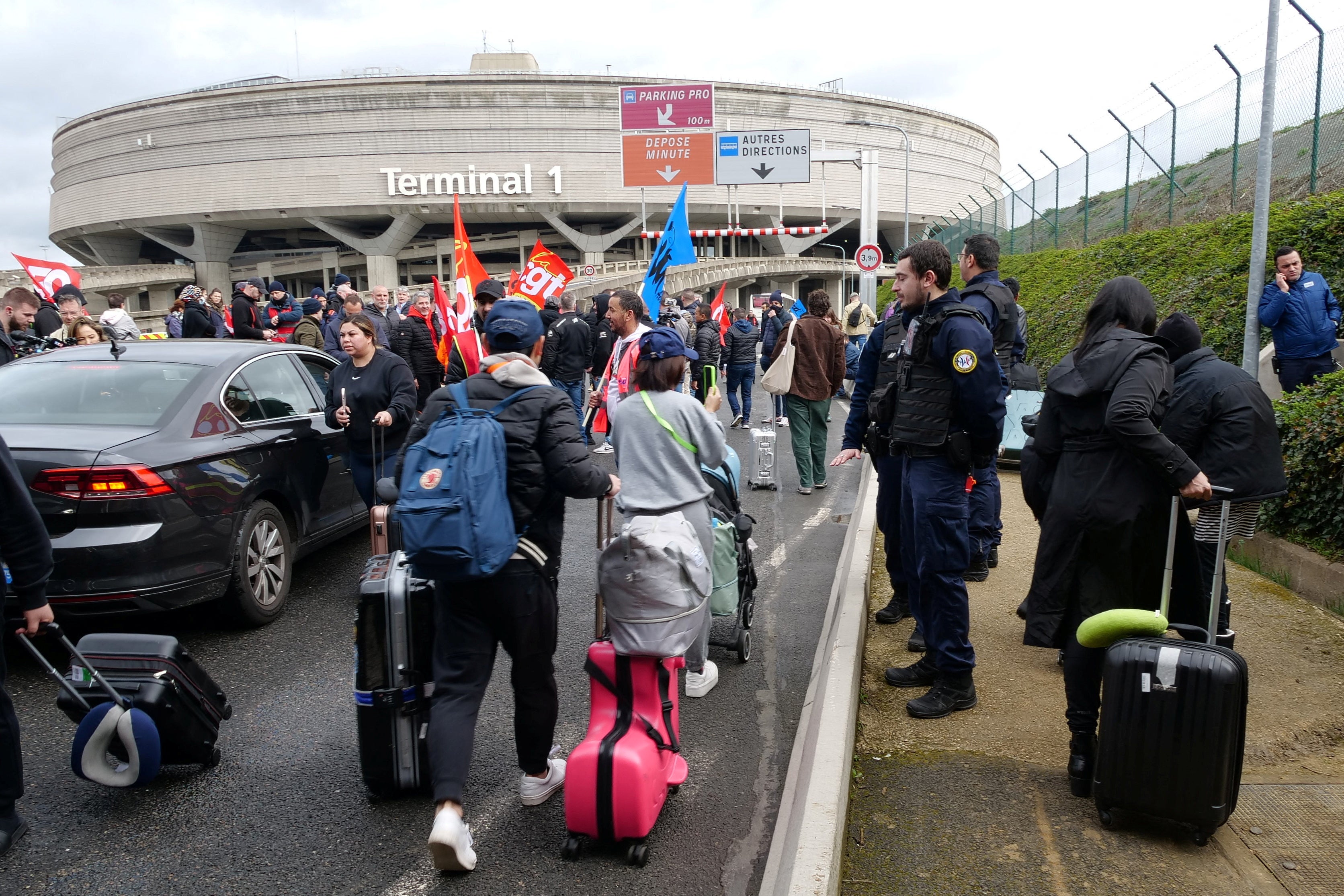Can we claim some money back over lost holiday time?
Simon Calder answers your questions on Corfu, strikes in France, damaged passports and tipping culture


Q Our holiday flight from Newcastle to Corfu is now flying two hours later than we planned going out, with the return coming back eight hours earlier on return. That’s 10 hours in total lost. That is after paying over £5,000. Absolutely shocking. Compensation possibly?
Name supplied
A How maddening. I am fairly sure that what has happened here is that instead of an originally planned Newcastle-based aircraft making the trip for your holiday flights, it will be effectively a Corfu-Newcastle-Corfu rotation that drastically cuts your time on holiday. For example, you might originally have been due to fly out at 9.30am, arriving around 3pm local time in Corfu. The return leg of that flight would leave at around 4pm local time, getting you back at around 5.30pm UK time.
Instead, on the day of departure the plane starts from Corfu at (say) 9am, landing at Newcastle at 10.30am local time. This will then turn around and leave at around 11.30am for a 5pm arrival. The homeward journey will be annoyingly early, rather than a relaxing late-afternoon departure.
Holiday companies often sell their trips based on what they expect to offer in terms of flights but leave it absolutely clear that these times can vary. It is thankfully rare for there to be a change as extreme as yours. You have every right to feel indignant, but under the Package Travel Regulations I do not believe this will be interpreted as a major change that gives you the right to compensation or to cancel the trip for a full refund.
I would, though, ask the holiday company – through your travel agent if you used one – for some kind of non-monetary compensation, such as a room upgrade, in return for messing you around. And it might also be reassuring for you to learn that both Newcastle and Corfu airport will be much quieter when you pass through than they would be had the plane kept to its original timings.

Q I am trying to book up some holidays for me and my wife to kick-start our retirement. Can you recommend any destinations that won’t be affected by the French air-traffic control industrial action? We are flying British Airways from Glasgow to Heathrow today and have just been told about a delay due to the French air-traffic controllers striking. So it seems hard to avoid.
Paul M
A Three of the final four British Airways flights yesterday from Glasgow to London Heathrow were delayed by around an hour (the final one was cancelled completely). I tracked the day’s work for the aircraft involved and couldn’t see any evidence of a journey that would have involved flying over France – the closest I found was a round-trip from Heathrow to Amsterdam. A cynical person might suggest that BA and other airlines are using French air-traffic control as a default excuse for any delays. But let me be charitable and suggest at least two ways in which the continuing protests in France against President Macron’s pension reforms could be responsible for the delay you experienced.
First, airline duty offices are hives of activity in which the general principle is to ensure passengers arrive as close to the advertised time as possible. If crew or an aircraft have been delayed, that can have an implication for later flights. For example, the early afternoon departure from Ibiza to Heathrow was an hour late, presumably being held on the ground at the Spanish airport for a slot to fly across France. That may have had repercussions for crewing or equipment for other flights.
Next, disruption such as restrictions over France can affect the Europe-wide aviation system, with heavier than usual pressure on airspace used by carriers to avoid the problem area. So I am afraid that any attempt to avoid French airspace may be futile. And Ryanair warns that action will continue at least until 1 May. You can, though, minimise the risk of disruption by flying point-to-point as much as possible rather than changing planes en route, particularly at highly stretched Heathrow.

Q I checked in and showed my passport and visa at the airline desk this morning to travel to Cuba. I was all checked, had my boarding pass and waited for the gate announcement. When I handed my passport to the last TUI staff member she noticed a very slight tear in it. The chip is intact and the photo is normal. But she said I couldn’t travel on this passport. She sent a photograph of it to the airline head office, who made the final decision that I could not travel. My luggage was offloaded and I am on my way home.
My travel insurance company has said this is not covered. I am devastated. Is there anything I can do?
Name supplied
A How desperately upsetting for you. It will be of no consolation for you to learn that these cases come to my attention extremely rarely – no more than a handful a decade. Nor will it help to know that, in my experience of Cuban immigration, there would not be any problem in getting into the country. The staff member and the airline will no doubt cite the same concern as the Home Office expresses: “Damaged passports can mask fraudulent tampering.” The main issue is about the personal data page, where the photo and your details are protected by laminate. If this shows signs of being lifted, officials may suspect some kind of foul play.
But the point at which reasonable wear or tear becomes damage so severe that you cannot be allowed to travel is debatable. In your position, if I felt my passport was still in reasonable enough condition, I would do as follows: book a cheap Mediterranean trip in the next day or two with a different company to somewhere appealing (there are plenty of last-minute packages around). You deserve a holiday, after all. If you successfully travel out and back with your existing passport, then you will have a reasonable legal case to claim against the company for denying you boarding. But this carries some risk of throwing good money after bad. If you live near an airport, I suggest you go along and sound out the opinion of airline ground staff before you commit more cash. Good luck.

Q You have been talking a lot about tipping recently. When I did a tour in Kenya, the guide suggested what to give him and the bus drivers. This was a lot more than I expected to pay, adding to an already expensive holiday. What do you think I should be expecting to pay for an organised tour?
Fiona P
A Your excellent question throws light on a really tricky matter. You paid (I presume) thousands of pounds for what I hope was a memorable holiday in a beautiful, friendly and fascinating country. But in general on almost any organised trip, the guide – and driver – will expect a tip at the end.
One exception is overland trips with expatriate staff, where I don’t believe it is customary. Otherwise, I factor in what I believe is a reasonable sum when calculating the overall cost. For a week’s trip, in any part of the world, I plan on somewhere between US$50 and US$100 for the driver and the guide. (If there are two drivers, I would tend to split the tip between them.) In North America, such a sum is expected, and may even be stipulated by the guide towards the end of the trip. It is so much part of US culture that, after an appallingly organised eclipse tour in 2017, with Intrepid, I still handed the guide $100.
There is an understanding in the tourism industry that travellers will tip, and guides and drivers are paid on that basis. Your hard-earned cash goes much further, and means much more to tourism workers, in other parts of the world. I sense a failure by your travel firm to manage expectations by outlining what normally happens. In the circumstances in which you found yourself, with the guide prescribing the appropriate amount, I can see it would be difficult to do anything other than comply. I suggest you take it up with the travel firm you used and say that tour participants need to know the usual tipping practice. If they have any sense, they will offer you an appropriate discount on a future trip.
Email your question to s@hols.tv or tweet @simoncalder
Join our commenting forum
Join thought-provoking conversations, follow other Independent readers and see their replies
Comments

Bookmark popover
Removed from bookmarks